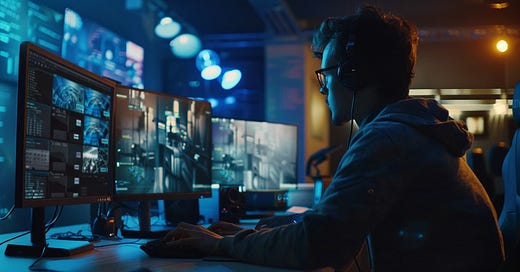AI Video technology is ripping through the video production world like a tornado, turning everything upside down. Just over a year since its debut, it’s breaking boundaries in creation, editing, and consumption of video content, opening new doors for creators and audiences alike.
Gone are the days when producing high-quality video demanded a king's ransom in equipment, talent, and time. Now, AI tools are cutting through the noise, enabling the creation of content that was once either impossible or too time-consuming to craft manually. Think special effects, animations, entire scenes, or even characters – all conjured up with the wave of an AI wand.
AI-powered editing tools are the speed demons of post-production, automating tasks like cutting, color correction, and rough cuts, letting editors focus on the juicy, creative bits. Visual effects that once drained budgets – de-aging actors, creating lifelike CGI – are now within easy reach, thanks to AI.
This tech isn't just a one-trick pony; it's a learning beast that adapts and improves, churning out better and more innovative content as it ingests new data and user feedback. The pace of this revolution is dizzying, propelled by fierce competition and relentless technological advancements.
Take smartphone cameras, for instance. Apple and Samsung’s rivalry pushed camera technology to new heights year after year. AI Video is riding a similar wave of rapid evolution.
This month, I dove into an online course on AI video at Curious Refuge. It’s a wild ride – challenging, yes, but utterly fascinating. I’ve always been a tech enthusiast, but AI Video hits differently. As a storyteller at heart, the prospect of crafting visually compelling narratives with this technology is exhilarating.
The training spans the gamut from prompt engineering to animation and movement. It’s daunting – six different programs just to whip up a 30-second travel commercial – but soon, producing high-quality AI videos will be a breeze. In a few years, millions of new filmmakers will flood the scene, their imaginations the only limit.
Even though AI filmmaking is a different beast, the essence remains: it’s all about the story and how you tell it. That’s the real challenge.
The past two decades have seen a surge in musicians, thanks to technology democratizing creativity. It’s the act of creation that counts, not just the audience. AI video is set to do the same. We might not see a new wave of Kubricks or Tarantinos, and sure, some film pros might need to upskill or risk obsolescence. But new, exciting work will emerge.
I’m just getting my feet wet in this new medium, so I have no polished masterpieces to show yet. But here’s a glimpse – a 30-second travel commercial I crafted for class. I wrote the script, inspired by my sci-fi comedy project, "Planet of the Jews," and decided to promote Mencia, the fictional planet from my story.
Using ChatGPT, I drafted and refined the commercial script. I generated the imagery with Midjourney and animated it with Luma Dream Machine. For the narration, I cloned a voice from YouTube using Speechify and merged it with the narrator’s image in DV-DI. After upscaling everything to 4K with Topaz Gigapixel and Video AI, I brought it all into Final Cut Pro for editing, adding titles, effects, and music.
This was just two weeks into the course, working with these tools for the first time. It took about 10-15 hours to piece together a 30-second spot. There’s definitely a learning curve, but the possibilities are mind-blowing.
Here's the result. Remember, I’m just a beginner.
Before the class, I created this video with Luma Dream Machine. Again, I’m just a pre-schooler, playing in the digital sandbox. And having big fun doing it.
OpenAI’s Sora is the latest game-changer, going public in a few months, is generating near-perfect cinematic videos up to 60 seconds long from simple text prompts. Sora’s debut with a promised winter release, sent shockwaves through the creative industry with its ability to craft entire trailers from mere words.
This video shows what Sora can do, along with the prompts that were responsible for the videos.
AI is democratizing filmmaking, tearing down technical and financial barriers, and empowering filmmakers to enhance their storytelling. I used to think AI was just buzzword fodder, but Sora is proving me wrong. It can generate ultra-realistic scenes, like a stylish woman strutting through neon-lit Tokyo, from just a few words.
AI is a double-edged sword – it opens doors for more content creation but also threatens traditional roles like videographers and animators. The tech is evolving at breakneck speed, and while it brings exciting opportunities, it also poses significant challenges for many industries.






"Democratizing filmmaking" is an odd notion. Filmmaking has been notable for having costs plummet to the point where anyone with a phone can shoot and edit. Does Chatgpt "Democratize" Writing? Does Midjourney "Democratize" painting? No, it just gives the untalented a veneer of technical competency, creating a bigger haystack where the rare and hard-to-find needles of art are tossed.
This is very interesting work, Bret. Menschia is a damn hoot!